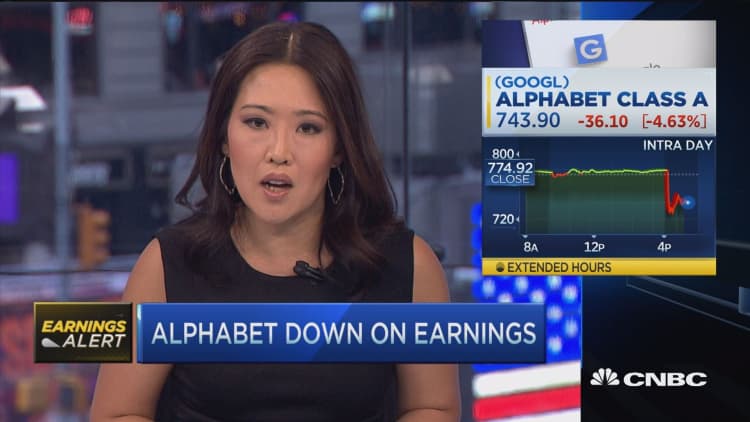


Alphabet shares fell in Thursday after-hours trade after the company reported earnings and revenue that fell short of analyst expectations.
The Google parent company said it saw adjusted first-quarter earnings of $7.50 per share on $20.26 billion in revenue. Analysts expected Alphabet to report earnings of about $7.97 a share on $20.37 billion in revenue, according to a consensus estimate from Thomson Reuters.
After those results were released, the company's class A shares fell by about 6 percent in after-hours trading, but then pared some of those losses.
The lower-than-expected quarterly results were potentially due to Alphabet's "other income" line, which was hurt by losses in foreign currency exchange and equity investments. Those figures came in lower than some analyst models predicted.
Despite missing Wall Street's expectations, Alphabet's adjusted earnings still rose nearly 16 percent from the comparable $6.47 per share during the same period last year, and its revenues also grew by double-digits percent.
"Our Q1 results represent a tremendous start to the year with 17 percent revenue growth year on year and 23 percent growth on a constant currency basis. We're thoughtfully pursuing big bets and building exciting new technologies, in Google and our Other Bets, that position us well for long term growth," Ruth Porat, CFO of Alphabet, said in the company's Thursday earnings release.
During the company's Thursday afternoon earnings webcast, Porat said "ongoing strength of the U.S. dollar" had caused a year-over-year negative currency impact on Alphabet revenues of $762 million — or $593 million after the benefit of its hedging program.
"When you're the most successful company in your market, it's hard to grow faster than the market," Kevin Landis, Firsthand Capital chief investment officer, told CNBC. "Sometimes if the macro picture slows down a little bit, you're going to slow down, too."
The company reported that its "other bets" business segment saw $166 million in revenues for the quarter. Wall Street had only expected on average about $140.7 million, according to StreetAccount.
Alphabet is always looking for the next big thing in technology, and that's reflected in its non-Google "other bets" business category.
"They approach 'other bets' somewhat like a venture capitalist would," James Dix, analyst at Wedbush Securities, told CNBC's "Squawk on the Street" Thursday before earnings were released. "So, there are certain milestones which they require of those other bets in order to continue to get resources."
Within the company's key paid clicks metric, Alphabet reported it saw year-over-year aggregate growth of 29 percent — topping the average Wall Street estimate of 26.8 percent, according to StreetAccount.
Aggregate cost-per-click, the average price of online ads, fell 9 percent year-over-year for the quarter, the company said. Analysts had expected a 5.8 percent decline.
On the Thursday webcast, Google CEO Sundar Pichai said the company's artificial intelligence work is "one of the key ingredients" to making the search business more convenient for users, and those endeavors have already begun "to bear fruit in many ways."
Those AI achievements included its AlphaGo program defeating world-class player Lee Sedol in Seoul. "This is another step towards creating AI that could help us with everything from our daily tasks to potentially even bigger challenges like climate change and cancer diagnosis," Pichai said.
In the first quarter, Alphabet repurchased 3.2 million shares of its Class C capital stock for a total amount of $2.3 billion, the company said.
Alphabet class A shares have risen more than 43 percent over the last year, and it remains a favorite of many Wall Street analysts. Still, the company faces stiff headwinds in Europe.
On Wednesday, the European Union charged Google with using its dominant Android mobile operating system to squeeze out rivals, opening a second front against the U.S. technology giant that could result in large fines. EU antitrust regulators said that by requiring mobile phone manufacturers to pre-install Google Search and the Google Chrome browser to get access to other Google apps, the U.S. company was harming consumers by stifling competition.
Google is already facing EU charges over the promotion of its shopping service in Internet searches at the expense of rival services in a case that has dragged on since late 2010, despite three attempts to resolve the issues. But the stakes are higher for Google in the Android case; it made about $11 billion last year from advertising sales on Android phones through its apps such as Maps, Search and Gmail, according to estimates by financial analyst Richard Windsor.
— Reuters contributed to this report.


